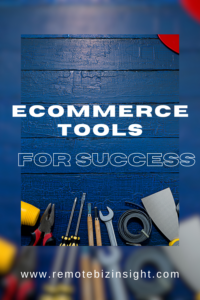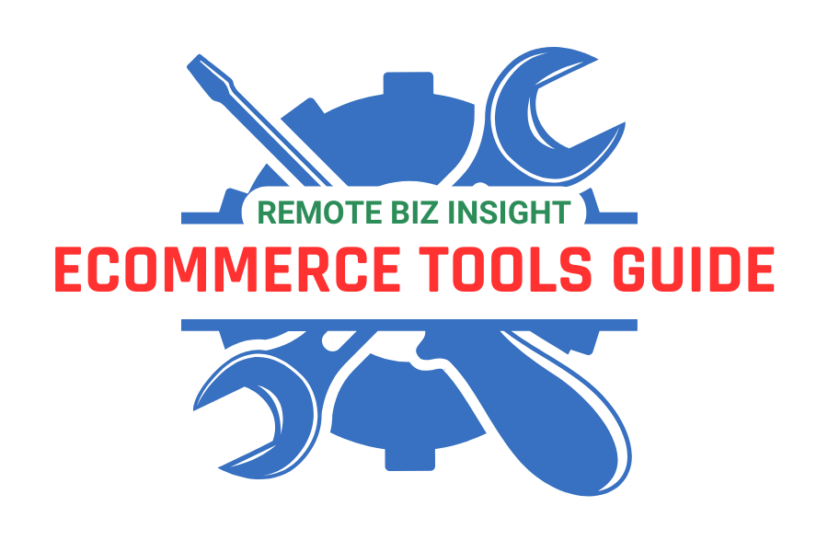Ecommerce Tools for Success
In the rapidly evolving world of ecommerce, having the right set of tools at your disposal can be the difference between thriving and merely surviving. I can attest to the transformative power of effective ecommerce tools in building, managing, and scaling online businesses. I find tools to be a vital part of my business.
Introduction
The Evolution of Ecommerce
Ecommerce has come a long way from the simple online transactions of the past. Today, it encompasses a complex ecosystem involving sales, marketing, user experience, and analytics. The growth of ecommerce has been propelled by technological advances, changing consumer behaviors, and the global reach of the internet.
Why the Right Tools Matter for Your Online Business
Choosing the right ecommerce tools can streamline your operations, enhance customer experience, and boost your marketing efforts. From building your website to processing payments and managing inventory, each tool plays a crucial role in the success of your online store.
Building Your Online Store
Creating an inviting and efficient online store is the first step towards ecommerce success. This is where your customers interact with your brand, making it imperative to choose platforms and tools that align with your business needs and goals.
Website Builders and Platforms
- Shopify: A leading ecommerce platform that offers a balance of ease-of-use and powerful features, Shopify is ideal for businesses of all sizes. It handles everything from website creation to payment processing, making it a one-stop-shop for online retailers.
- WooCommerce: For those already familiar with WordPress, WooCommerce provides a seamless integration, transforming your site into a fully functional online store. It’s flexible, open-source, and perfect for merchants who want complete control over their site.
Shopping Cart and Checkout Optimization Tools
- BigCommerce: Known for its comprehensive set of built-in features, BigCommerce caters to businesses looking to scale. It offers various customization options to optimize the shopping cart and checkout process, enhancing the customer experience.
- Optimizely: This tool allows you to run A/B tests on your shopping cart and checkout pages, ensuring you find the most effective layout and flow for converting visitors into buyers.
Selecting the right platform and optimization tools is crucial in establishing a solid foundation for your online store. These tools not only help you set up shop but also ensure a smooth shopping experience for your customers, directly impacting your sales and growth.
Advancing from the structural elements of your online store, let’s focus on enhancing the overall user experience (UX). A great UX can significantly boost your conversion rates, retain customers, and encourage word-of-mouth recommendations.
Enhancing User Experience
Creating an intuitive, enjoyable, and easy-to-navigate online store is paramount. Here’s how you can leverage tools to enhance UX and keep your customers happy and engaged.
User Interface and Experience Design Tools
- Adobe XD: Adobe’s UX/UI solution offers a range of design tools for creating wireframes, prototypes, and high-fidelity designs. Its collaboration features make it easy to share designs with team members and gather feedback.
- Sketch: Popular among UI designers, Sketch provides a comprehensive suite of design tools tailored for web and mobile app designs. Its simplicity and plugin ecosystem make it a powerful choice for ecommerce site design.
Customer Feedback and Analytics Tools
- Hotjar: Understanding how users interact with your site is crucial. Hotjar offers heatmaps, session recordings, and feedback polls to give you insights into user behavior, helping you make data-driven improvements.
- Google Analytics: An essential tool for any ecommerce site, Google Analytics tracks and reports website traffic, conversion rates, and user behavior, offering insights that can help refine your marketing strategies and enhance UX.
Incorporating these tools into your ecommerce strategy enables you to design a site that’s not just visually appealing but also user-friendly and optimized for conversions.
Marketing and SEO
No ecommerce business can thrive without a solid marketing and SEO strategy. Fortunately, there are tools designed to increase your online visibility and attract more customers.
SEO Tools for Ecommerce
- SEMRush: This comprehensive SEO toolkit helps you perform keyword research, track the keyword strategies of your competitors, and run SEO audits of your blog. SEMRush is invaluable for improving your site’s visibility and performance.
- Yoast SEO: Specifically for WordPress users, Yoast SEO simplifies the complexities of SEO, guiding you through optimizing your content and ensuring your site meets the highest technical SEO standards.
Social Media and Email Marketing Tools
- Mailchimp: Email remains a powerful tool for ecommerce marketing. Mailchimp offers email campaign management, automation, and analytical tools to help you reach and engage your audience effectively.
- Hootsuite: Managing multiple social media accounts can be overwhelming. Hootsuite allows you to schedule posts, track social media traffic, and engage with your audience across all major platforms from a single dashboard.
Utilizing these marketing and SEO tools can significantly boost your store’s reach and visibility, driving more traffic and, ultimately, conversions.
Operations and Management
Efficiently managing your inventory, orders, and shipping processes is crucial for maintaining customer satisfaction and scaling your business.
Inventory Management Software
- Shopify Inventory Management: Integrated seamlessly with the Shopify platform, this tool helps you track stock levels, automate restocking, and analyze sales trends to make informed decisions.
- Cin7: Offering a more comprehensive solution, Cin7 connects your sales channels with suppliers, streamlining your order management and inventory tracking across multiple platforms and locations.
Shipping and Fulfillment Solutions
- ShipStation: Simplify your shipping process with ShipStation, which integrates with a wide range of ecommerce platforms and carriers, automates shipping decisions based on your preferences, and provides customers with real-time tracking information.
- Fulfillment by Amazon (FBA): For those selling on Amazon, FBA handles storage, packing, and shipping for your orders, and even manages returns and exchanges, allowing you to focus on other aspects of your business.
Customer Service and Retention
In the competitive landscape of ecommerce, excellent customer service and strategies to retain customers are paramount for long-term success.
Customer Relationship Management (CRM) Systems
- HubSpot CRM: This free CRM solution offers a comprehensive set of tools to manage your customer interactions, automate sales processes, and provide exceptional customer service, all in one place.
- Salesforce Commerce Cloud: Designed for scalability, Salesforce provides a CRM solution that supports ecommerce businesses at every stage of growth, with a focus on creating personalized customer experiences.
Loyalty and Reward Programs
- LoyaltyLion: An easy-to-integrate loyalty platform that encourages repeat business by rewarding customers for purchases, referrals, and social media engagement.
- Smile.io: Offers customizable loyalty, referral, and VIP programs to enhance customer retention and turn transactions into relationships.
Security and Compliance
Ensuring the security of your ecommerce platform and compliance with data protection laws is non-negotiable in today’s digital age.
Payment Security Tools
- Stripe: Stripe simplifies online payments by handling everything from storing cards, subscriptions, and direct payouts to your bank account.
- PayPal: Offers a secure and widely accepted payment gateway that provides both sellers and customers peace of mind during transactions.
Data Protection and Privacy Compliance
- TrustArc: Helps ecommerce businesses manage privacy compliance with tools to build transparency, accountability, and trust between you and your customers.
- Avalara: Manages sales tax compliance, calculations, and filing for businesses of all sizes, ensuring you stay compliant with changing tax laws and regulations.
Conclusion
Building a thriving ecommerce business in today’s digital marketplace requires more than just a great product. It demands a toolkit equipped with the best tools to create an engaging store, streamline operations, implement effective marketing strategies, and provide exceptional customer service.
The right tools can provide you with an edge, enhancing your efficiency, productivity, and customer satisfaction.
FAQ Section
- What are the first tools I should invest in for my ecommerce site?
- Start with a platform like Shopify or WooCommerce, and invest in essential SEO and marketing tools to drive traffic to your site.
- How can I improve my ecommerce site’s SEO?
- Use SEO tools like SEMRush and Yoast SEO to optimize your content, and visibility, and rank higher in search engine results.
- What’s the best way to manage inventory for an online store?
- Consider using inventory management software like Cin7 or Shopify’s built-in tools to automate and streamline your inventory tracking.
- How can I ensure my ecommerce site is secure for customers?
- Invest in secure payment gateways like Stripe or PayPal and consider security tools for compliance and data protection like TrustArc.
- Can ecommerce tools really help increase sales?
- Absolutely. The right tools can enhance your site’s user experience, improve efficiency, and boost your marketing efforts.
Your journey to ecommerce success is ongoing, and these tools are your allies every step of the way. Embrace them to build, grow, and sustain a flourishing online business.





